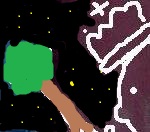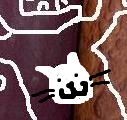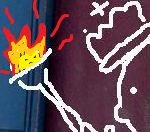Full Disclosure: Miriam’s a mate, we talk poetry fairly regularly. Hope you trust me to be impartial.
Review: Pirate Music is one of those titles that accumulates meaning as the book progresses. My initial response to the phrase is the imperative ‘download music illegally’ or ‘music illegally downloaded’. If I’m feeling a bit fanciful maybe ‘music played by (seafaring) pirates’. I’ll come back to this.
If there’s an aesthetic trend in recent poetry from these islands, it might be towards a kind of surface grubbiness, striking an attitude that says ‘look at how open I am about my awfulness, aren’t I a straight-talking and unillusioned Gen Y poet’. While it’s true that there are a great many aspects of anglophone culture that are truly despicable, and certainly they must be a factor in any valuable artistic response, grandstanding about the poet’s moral ambivalence (or generally rendering injustice as a source of titillation) seems rather beside the point; perhaps grandstanding at all in the face of a society propped up by grandstand thinking seems problematic. Pirate Music often figures its narrator and (remarkably various) cast as a tragicomic product of comprehensive social conditioning; the sheer number of malfunctioning protagonists hint at the nature of the society to which they belong.
Belonging in Pirate Music is no simple matter, of course, and some of its finest work comes out of this tension between social demands for normalisation and the personal imperative to be weird as balls. Poems like ‘Mi Territorio’ and ‘Meditations on a Dead Pigeon’ dramatise this in their remarkable management of tone, playing highfalutin vocabulary – ‘its gorge rises at the slightest hint of a calumny’, ‘this clutch in the throat // this drenched, foul fragment of the universe’s / nether spaces’ – against its base subject matter. In ‘Meditations…’ underneath the swooning, hand-to-the-forehead ‘Take it away’, a transaction is suggested: in exchange for the pigeon’s proper disposal the poet ‘will scrub, bleach, pledge to don the bustle and the corset’, ‘Bring in, after all, the big boys. I can learn to live by rote.’ ‘[T]he boys’ here strikes a very Ulster note, and the connection between the ability to look a dead pigeon in the eye and the capacity for self-determination is a bleakly comic one. It’s also tempting to read this as a parody of some poets’ outright revelling in the presence of dead animals, but that’s probably just me. What is clear is that weakness – and compassion, implicitly, is weakness – will not be tolerated.

And this seems a key point in a collection that invests humanity (maybe personality is a better word) in animals to an extent rarely seen since Ted Hughes heyday, and not with such clear-sightedness, such philosophical rigour. Much like Hughes, Gamble’s animals are often more complex than their sapiens cousins; over the course of several poems Gamble’s horse becomes one of the book’s major symbols, not least in ‘Dressage’:
‘I who would not be tamed
have turned my mind to taming you.
The world is out to rub our edges off:
we must bend and submit, bend and submit. […]
Why am I learning? Why are you yielding?
I want to drive smack into a concrete wall
singing I am an Antichrist, I am an Anarchist
at the top of my unacceptable lungs.
I never wanted to be in it for the long haul.’
Though once again deployed in a semi-ironic mode, ‘Dressage’ ropes in concerns from throughout the book. There’s an almost-irrational solidarity in the blunt syntax of ‘In the Fall’: ‘You arked this flood together. / Horse must never be betrayed.’ ‘Normalisation’ frames preparation for social acceptability in terms of horse-grooming, in the vocabulary and tonal primness of a finishing-school aristocrat: ‘Take from the kit a metal curry-comb / and begin tackling the most intransigent layers […] Repeat, until you know your left foot from your right’. That closing line seems to draw comparisons between sectarian identity-politics (‘what foot do you kick with?’) and the politics of respectability: what are you willing to sacrifice in exchange for admission? What simplistic formulae will you obey in exchange for safety, comfort, normality? The erasure of social media for professional purposes in ‘Wipe’ results in ‘a Wild West showdown with a taciturn computer / that doesn’t believe in anything, and has no history, / and laughs and laughs and laughs and laughs.’ It’s not paranoia, the book suggests, when they are not only out to get you, but enjoying it.
‘Dressage’ is a thoroughly unglamorous poem, even down to its invocation of the now-golf-playing, butter-advertising Johnny Rotten. The following poem, ‘Bodies’, suggests this brand of song-lyric anarchism will indeed fall short:
‘A horse must learn to carry its own weight […]
like the mind-hand’s realisation
that a song does not work by sound alone –
that you must listen to the words and write it off
if you do not like them. That you cannot have
‘fuck this’, ‘fuck that’ and ‘I’m not an animal’
without ‘she’s a bloody disgrace’;
that you cannot merely sing along to the good bits’
That this immediately follows the book’s most fervent annunciation of nonconformity seems significant. Nothing is quite so simple, and nothing happens without the ‘light but present […] watchful eye of the law’.
The music here points back to the figure smack in the middle of Pirate Music, the dying whales that feature in three consecutive poems, ‘Précis’, ‘Pirate Music’ and ‘It’. In the first, a whale is beached and becomes ‘property // of the Lord Paramount of Constable’, ‘the skull emptied of its fluid; / It lights, beneficent, // towns with its bulbous head’. This whale is literally exploited for material gain, ultimately ‘a lone child’s playground, / apparatus, animal shit’. The last, ‘It’, concerns the whale that entered the Thames estuary a couple of years ago and died of the noise of the city, ‘the bosom of a populace agog // with good intentions – we want to make it / one of our own‘, bearing in mind the book’s deep aversion to this kind of unasked-for assimilation. The sting in the tail: ‘Later, interpreters of sonic bleep / intuit peace was not what it had come for.’ These two poems seem two sides of a coin: the whale that appears in self-sacrifice for the benefit of others (much like the unrecompensed tailor in ‘Dressing Fleas’) and the whale uselessly but determinedly ruining itself ‘within sight of the English throne’ (like the incalcitrant feral kitten in ‘An Encounter’, ‘on the uncontroverted throne / of its scalding freedom / the little fucker sat’). The book repeatedly finds itself drawn between obedient belonging and vainglorious ‘freedom’.
I mentioned the shifty nature of the book’s title, and the title poem throws unexpected light on it:
‘For ten plus years
they monitor the call, deepening and desperate,
off range,
of a whale
believed to be
the only one
of its kind
no other marks
his particular rhythms;
with timbre
and timing out of sync
he is doomed
to understand
and not
to be understood […]
turn the dial;
he is in
your neighbourhood
and this is not
a parable’
Unlike the democratic illegality of pirate radio, the whale’s ‘song’ is pitched outside the range of other whales; its individuality condemning it to solitude. The closing line is partly a cute rebuff to interpreting the poem as ‘poet = lonely, noble, unique animal’ and partly to emphasise that this is a natural phenomenon that has significance of its own; the natural world does not exist to reify the world of humans, and the whale’s solitude is legitimately moving (perhaps more so) without the reader’s impulse toward metaphor.
Elsewhere, there is a hell of a lot to admire, and it’s been a long time since I’ve read a book multiple times for the sheer pleasure of it; probably since Miller’s The Cartographer… Morrissey’s Parallax, maybe Olds’ Stag’s Leap. The book has a sense of humour that acknowledges the formal conventions of poetry as far as they facilitate its humane and unselfconscious desire to communicate, to be heard and understood. To put it another way, I defy the reader to find another recent book of poems that curses so effortlessly; when the wild cat in ‘An Encounter’ is ‘the little fucker’ it is the most fitting way of describing it, not, as Taylor Mali has it, the Acceptable Poetry Swearing ‘to show that I am fuckin serious, man’. There is so much more to talk about in this book, which I will leave to other reviewers (of which there should be a great many); Pirate Music has a wonderful line in poems about paintings (particularly ‘Albrecht Durer: Lansquenet and Death, 1510′, in which the mercenary confuses Death for an addict, ‘Here – buy yourself a burger or something‘), unsettling tableaux (‘After Keith Douglas’, ‘The Horses’), and in love poems, for instance the beautifully odd ‘Cuba’, ‘Let us not grow watertight’.
Tl;dr: Read it read it. If this doesn’t get on the TS Eliot I will personally riot.

